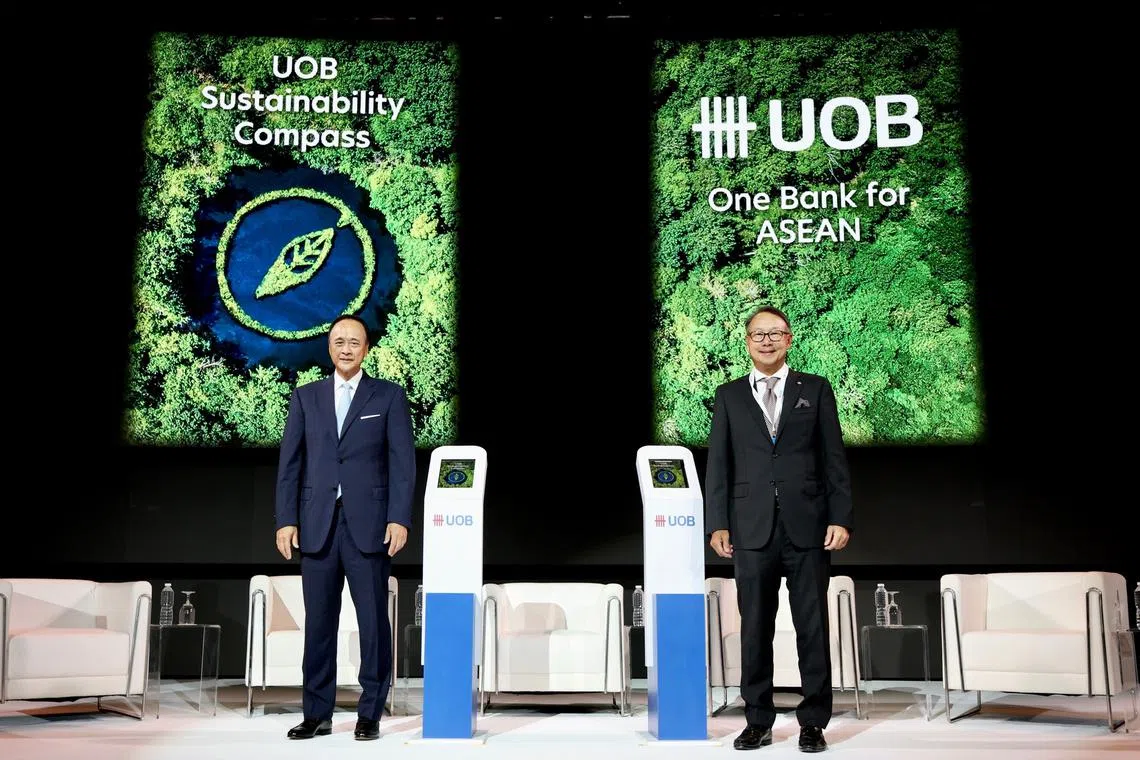No sustainability, no impact: Corporates can’t be in two minds, UOB heads say
The bank has created a transition finance framework to support clients on their decarbonisation journeys
HIGHLY impactful and profitable companies of tomorrow are those delivering on sustainability today. UOB’s Leong Yung Chee and Eric Lian, who head the group’s corporate banking and commercial banking arms respectively, are convinced of this.
Leong said fast-evolving consumer conscience has, in recent years, spread beyond “traditional environmentalism” – where caring for the planet was more of a marginal concern – with an increasing portion of the population now pushing for more sustainable products.
That means sustainability is today an imperative and a wave for companies to ride. “The scale of the environmental and social challenges facing the world today requires massive deployment of capital, technological innovation and systems change,” he said.
“Companies that understand how they can create impact through responding to these challenges and pivoting their business models to capture new opportunities will succeed in both profit and planet.”
Meanwhile, Lian sees a “perfect storm” brewing on the horizon that is “too big to ignore” – one that is made of sustainability-focused legislation, expectations of action from investors and customers, as well as heightened risk stemming from environmental and social inaction.
“Having a strategy which embeds environmental, social and governance (ESG) considerations is no longer viewed as an option, but a sign of future-readiness, relevance and competitiveness,” he remarked.
Navigate Asia in
a new global order
Get the insights delivered to your inbox.
The two executives were sharing their views on sustainability impact in an interview with The Business Times.
First-mover advantages
Given the outlook, it would be remiss of companies to hang back, they stressed.
Leong sees “significant first-mover advantages” that large corporations can leverage – for instance, their ability to respond to rising consumer demand for more sustainable products, given their economies of scale.
SEE ALSO

Banks are increasingly offering transition financing because they recognise the need to help such corporations start early, he said. This gives them a longer runway to manage the transition and avoid sudden disruptions to their business.
UOB recognises this as well – it has created a transition finance framework to support clients on their decarbonisation journeys, so companies “would not have to make abrupt or extreme changes to their business models that would impact profitability”, he said.
The framework, launched last September, comprises a set of “tailor-made” solutions for clients from carbon-intensive industries that are unable to access the bank’s green financing solutions, such as those in oil, gas and chemicals; fossil fuel-based power generation; and metals and mining.

And as large corporations invest resources to support their suppliers in uplifting their sustainability credentials, it is only a matter of time before they spark a “cascading effect” throughout the ecosystem, Leong added.
He therefore expects to see an increase in companies with enhanced green and sustainability credentials that will differentiate them from their competitors.
Speed is of the essence
Speed, Lian pointed out, is where small- and medium-sized enterprises (SMEs) have the upper hand.
Noting that smaller businesses can tap agility as one of their key strengths in responding to this fast-changing environment, he said it is no coincidence that many of today’s sustainability innovations come from startups.
Aligning with broader social and economic development goals set by investors and the government can help unlock new opportunities for startups and smaller companies, he added.
This is possible as existing infrastructure and regulatory frameworks are already in place to support smaller players and their efforts to impact society positively, he said.
These include government grants and training programmes that help SMEs build sustainability capabilities, and capture opportunities for long-term business growth to contribute to Singapore’s established sustainability goals.
UOB has also simplified SMEs’ access to sustainable financing by creating frameworks that allow them to obtain green or sustainability-linked loans more easily, without the need for developing their own frameworks, which may be costly, Lian added.

With such access, SMEs “have an opportunity to be (at) the forefront of this change and to respond to growing requirements for sustainability to be embedded across their value chains, and in turn create positive impact for their customers and the planet”, he said.
Double materiality
What does a company that delivers on sustainable impact look like?
Leong said it is one that is able to go beyond articulating its theoretical goals, to integrating sustainability into its business strategies, setting ambitious and quantifiable sustainability targets, and linking these to its core business operations. Such companies are set to “lead the way”, he said.
Here, he brought in the concept of double materiality, which refers to not just the impact of sustainability-related issues on a company, but also a company’s impact, both positive and negative, on the environmental and social aspects of the wider community and economy.
Double materiality is “crucial” from the viewpoint of embedding sustainability into an organisation’s strategy, he added.
By thinking through two lenses, he said companies can chart their strategic direction in a way that responds more effectively to emerging risks and opportunities.
Lian, however, recognised that the road to sustainability impact is paved with challenges. For companies to succeed at scale, they will need to rely on an ecosystem of support, he said.
This is even more pertinent for SMEs that typically lack the means to allocate dedicated resources to rethinking and remodelling their businesses through the sustainability lens, he pointed out.
Thus, governments, regulators, industry associations and financial institutions all have their part to play to provide support, he said, citing UOB’s Sustainability Compass tool as an example.
Beyond extending funding, UOB offers its SME clients customised reports with clear and actionable insights based on their respective sectors through its Sustainability Compass, he said.
The bank’s innovation accelerator, The FinLab, also has initiatives such as the Sustainability Innovation Programme that connects SMEs to solution providers in areas such as energy efficiency, he added.
“With greater awareness of, and accessibility to, viable solutions, these SMEs will be able to better address existing operational challenges and even contribute positively to sustainable impact through their business practices.”
Securing buy-in
Notwithstanding the need for greater support, Lian said developing and scaling up innovative solutions has to be a natural outcome of SMEs working towards creating meaningful impacts in their day-to-day operations.
Sustainability “cannot be a standalone effort”; it must be integrated into a company’s strategy and linked to its corporate purpose, he added. And ultimately, “genuine ESG commitments, actions and practices will support long-term value creation in addition to gaining financial returns”.
To secure buy-in to begin addressing sustainability-related risks and unlock opportunities, the key lies in education, Lian said.
“Companies need to help internal and external stakeholders understand what the sustainability-related issues that will have the biggest impact on their business (are), and where they are focusing their strategy and efforts.”
These stakeholders may include employees, regulators, industry associations, banks, suppliers and, most importantly, customers, he said. Through such engagement, companies will be able to better pivot in the right direction and at the right pace, while also influencing the ecosystem that surrounds them, he added.
Be ‘clear and transparent’
Leong, meanwhile, said large enterprises should look into other areas of improvement while buy-in is almost certain, with “most regulators and investors (liking) the idea of companies earning positive returns and making a positive impact on the world”. Being “clear and transparent” in their disclosures on their sustainability efforts is one such area, he noted.
While it can be challenging to wade through the varied expectations of lawmakers, investors and communities, there are ongoing efforts to streamline and move towards a common disclosure standard globally, he pointed out.
For one, the guidance recently issued by the International Sustainability Standards Board is of paramount significance to companies communicating the impacts of their sustainability-related risks and opportunities, he said.
Guiding principles for positive impact can also be found in the United Nations’ Sustainable Development Goals, which suggest 17 different areas on which companies can focus their sustainability efforts, he said.
In terms of climate action, science-based pathways and national commitments to net zero also provide guidance and targets that companies can reference for their own decarbonisation efforts, he added.
In parting, Leong said: “Sustainability issues such as climate change and biodiversity and the need for a just transition will be the defining challenge of our generation. The opportunity is immense and the time for action is now.”
Decoding Asia newsletter: your guide to navigating Asia in a new global order. Sign up here to get Decoding Asia newsletter. Delivered to your inbox. Free.
Copyright SPH Media. All rights reserved.







